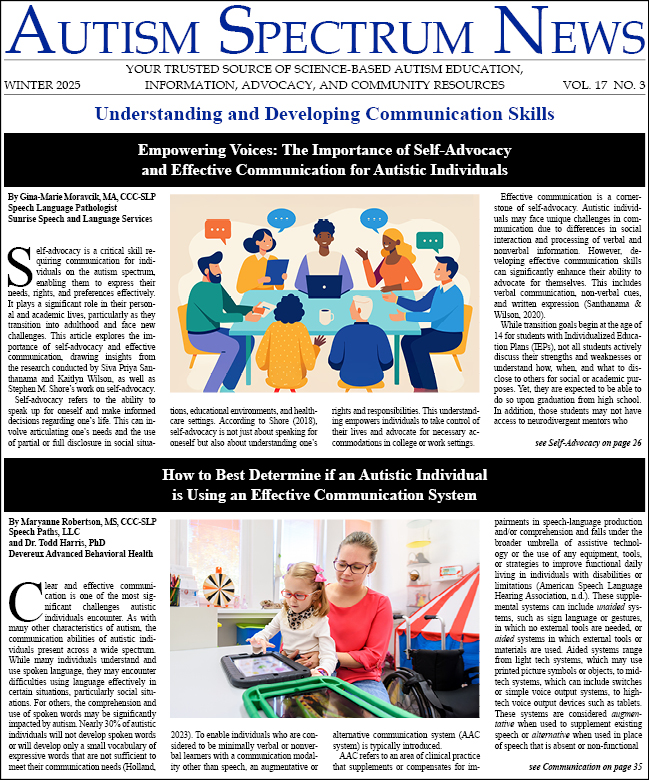While many articles focus on the challenges associated with being in a neurodiverse partnership, there are countless strengths that are unique to relationships in which one or both partners are on the autism spectrum. When partners search online forums, read books, or even access clinical services, the difficulties associated with having neurodevelopmental differences are often highlighted. While neurodiverse couples do face challenges because of areas of dissimilarity, these differences can also make their relationships rich and rewarding. This article proposes a paradigm shift in the literature to focus on the strengths and benefits of being in a neurodiverse relationship. Since the strengths of each partnership vary, a review of three common “superpowers” of neurodiverse couples will emphasize how differences can begin to be viewed as relationship assets.

Expanded Perspectives
Everyone has slightly different world views, which includes beliefs, thoughts, and opinions. For neurodiverse couples, perspectives of situations may be more dichotomous due to differences in brain wiring. While this could lead to conflict and misunderstandings, it can also help each partner expand their overall perspective and experience of a situation, much more than would be possible viewing the scenario independently. When couples collectively use these different lenses, they can create more comprehensive and effective plans and approaches. For example, if a husband on the spectrum has an idea about the most logical, quickest way to complete a task, and their neurotypical spouse offers a perspective of how this may impact them or the feelings and experiences of others, they can incorporate both logical and emotional approaches to develop a better plan than either would have devised autonomously. Couples therapy should focus on where each partner is coming from, and how to ground in context and communication. By deepening trust and improving communication, each partner can more effectively express their ideas so they can be incorporated in an overall plan. Receptiveness to other opinions and paradigms is crucial for successful integration of this strength. Inflexibility can be a core feature of Autism Spectrum Disorder for some individuals and may make integration of other perceptions more difficult (American Psychiatric Association, 2013). Thus, working to paradigm shift, or actively understand, consider, and incorporate each other’s thoughts and perspectives, can lead to enhanced ideas about the world and approaches in a variety of situations, from marriage to other areas of life.

Leslie A. Sickels, LCSW
Passions/Interests
Individuals on the spectrum may sometimes exhibit highly restricted interests (American Psychiatric Association, 2013). An individual with autism may spend significant amounts of time passionately reading, watching, or studying this interest, which can be about any topic. At the onset of neurodiverse relationships, some neurotypical partners describe themselves as their partner’s special interest. This level of devotion and focus on a person can support couples in connecting to build rich, fulfilling relationships. While the intensity of this interest may wane over the course of a relationship and cause a shift in focus to a different interest, which can evoke challenges, having more specialized interests can still be a major strength in a relationship. These interests can lead to shared activities or encourage the neurotypical partner to more deeply explore their own passions. When each partner has their own interests and hobbies outside of the relationship, it can increase their individual support systems, connections to others, and overall joy in life. This can take pressure off of the relationship to be the sole sense of fulfillment in a person’s life and allows each partner to independently explore interests and passions that are most enjoyable to them.
Commitment and Acceptance
At the onset of couples therapy, intentions and goals for the therapeutic work are set. These can range from couples wanting to work to maintain their relationship, separate/divorce, or there can be uncertainty about the next steps. Regardless of the goals of neurodiverse couples therapy, couples set intentions to work collaboratively in the service of their relationship. While partners may report feeling as though they are “speaking different languages” or that their styles are incompatible, their intentions are important because it speaks to the larger goals of the relationship (Myhill & Jekel, 2015). This allows neurodiverse couples to begin looking at differences as either something they can accept or actively work to change. When couples accept differences, they can shift from perceiving them as flaws or annoyances, to seeing them as qualities that makes their partner unique or even endearing. When this shift occurs, both partners can be more tolerant of differences and ground in the good intentions they have for their relationship. For areas of the relationship that require change, it allows neurodiverse partners to commit to addressing these topics in couples therapy. Commitment and acceptance lends to increased dedication and positive feelings towards one another, which can make neurodiverse couples happier and more satisfied in their relationship.
Conclusion
While not all areas of strength apply to each neurodiverse relationship, there are ways for every partner to shift their perspectives to see the differences in their relationship as positive benefits. This requires couples to acknowledge and understand how neurodiversity is impacting their relationship (Myhill & Jekel, 2015). Once they have an understanding of why differences are present, perspective-shifting to the strengths of neurodiversity can be a focus of the relationship and clinical work. By focusing on the positive attributes of neurodiversity, partners can deepen their connection and feel more fulfilled in their relationship because of their neurological differences, not in spite of them.
For more information about Leslie Sickels, LCSW and neurodiverse couples therapy visit LeslieSickelsLCSW.com.
If you are a therapist and want to learn more about supporting neurodiverse couples, Neurology Matters offers a training and certification program available at: aane.thinkific.com.
References
American Psychiatric Association. (2013). Diagnostic and statistical manual of mental disorders (5th ed.). Arlington, VA: American Psychiatric Publishing.
Myhill, G., & Jekel, D. (2015). Neurology Matters: Recognizing, understanding, and treating neurodiverse couples in therapy. FOCUS, NASW Massachusetts Chapter.




[…] Sickles, L. (2020). Autism Spectrum News. Recuperado de (https://www.autismspectrumnews.org/the-superpowers-of-neurodiverse-couples/). Traducido Por Maximiliano […]
This article is awesome. It’s both nice and refreshing to see the positives of neurodiverse relationships. Thank you!
Hello,
Even though I haven’t been diagnosed, I have some version of ADHD or am on the spectrum. My husband and I function extremely differently and our communication styles match those differences. Even though we’ve been together for 28 years and have raised an amazing daughter, there are issues in our relationship that have been an ongoing struggle for us. In addition to individual therapy, we’ve been seeing a couples counselor on and off for years and we’ve both been extremely involved in a process called Re-Evaluation Co-Counseling. All of this work has offered us a great deal of support and skills to handle our differences. But after my husband did some research and landed on this therapeutic work, we’re thinking this model could make a significant difference to us.
Please reply with whether or not you have openings for virtual individual and/ or group counseling and what the cost of both would be.
Thanks so much in advance. We look forward to hearing back from you.
Best,
Kimberly and Brian
Hi Kimberly – Since authors don’t necessarily monitor comments to their articles, if you are interested in reaching out to the author, I would suggest using the contact information provided at the end of the article. FYI, I removed the phone numbers from your comment for your privacy.
[…] Spectrum News (https://autismspectrumnews.org/the-superpowers-of-neurodiverse-couples/) “The Superpowers of Neurodiverse Couples” by Leslie A. Sickels – A web article […]